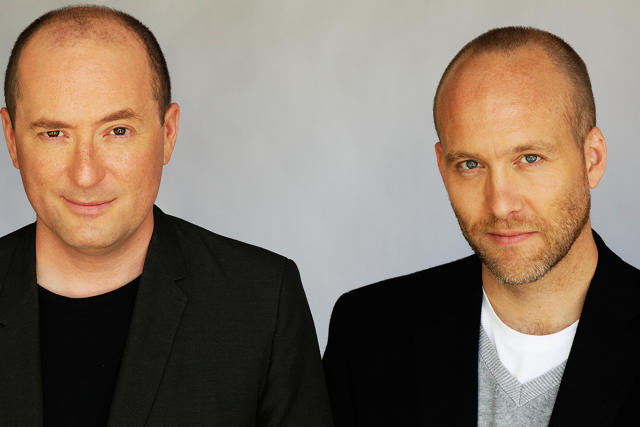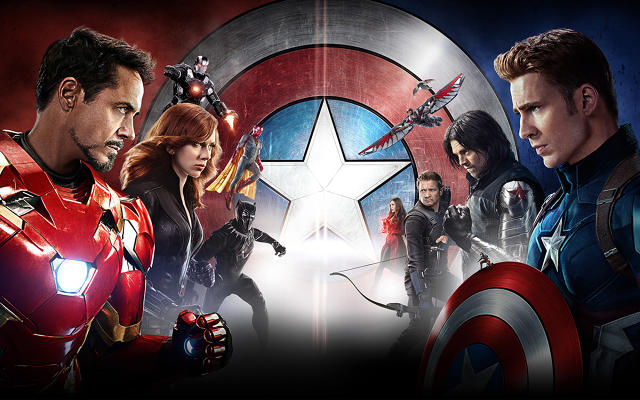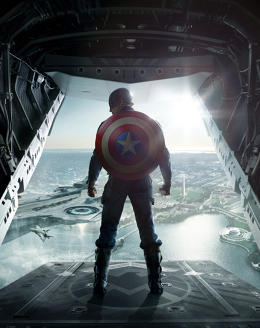There is no “Last week, in the Marvel Cinematic Universe” refresher course at the start of Captain America: Civil War. (Even a concise, zippy-paced attempt would run at least five minutes long.) Instead, viewers are expected to be familiar with the 10 or so movies that preceded this installment. Anyone who hasn’t seen them all will still pick up enough information to follow along, and lose their minds over the skull-rattling, nerd-ambrosia action scenes. But those who have been paying close attention every step of the way will be rewarded by seeing expertly crafted long-form storytelling culminate in a huge payoff.
Christopher Markus and Stephen McFeely aren’t the architects of the MCU—that would be studio head Kevin Feige and his inner circle—but they’ve become an indispensable part of the process. The screenwriting duo, who worship at the altar of Raiders of the Lost Ark and The Empire Strikes Back, first got involved when word circulated that a Captain America franchise was on the way, and decided they wanted in. The idea of a World War II-era superhero story held irresistible possibilities, many of which Markus and McFeely successfully conveyed in their pitch to Marvel. Midway through production on the first Captain America, though, the studio hired Joss Whedon to helm The Avengers. Captain America was no longer just the first installment in a hopeful franchise but a crucial thread in a much larger tapestry. The film even bore the gauntlet-tossing subtitle, The First Avenger.

Although admittedly not as much a phenomenon as 2008’s Iron Man, the film that kicked off Marvel’s unstoppable renaissance, Captain America was a rock-solid hit. It was both a self-contained adventure movie, with its own distinct flavor, and a promise of much more to come in the future. Since then, the team of Markus and McFeely have become the go-to screenwriters for the MCU. They’ve written all the Captain America movies, along with Thor: The Dark World, and they’re currently at work on the next two Avengers installments—which apparently will no longer be titled Infinity War: Parts I and II. Although Markus jokes that the two are “always one draft away from getting fired,” it’s pretty clear that in the house of Marvel, they are more than just dependable contractors.
As Captain America: Civil War prepares to incite a box office melee this weekend, Co.Create spoke with Markus and McFeely about the challenges and best practices of telling a long, interconnected story, coordinating with other Marvel filmmakers, and whether there is any end in sight.
Screenwriters Are Marvel’s R&D Department
“We tend to be a little bit like an R&D department in many of these cases, both in Civil War and in Winter Soldier and even in Infinity War, which we’re working on now,” Markus says. “We go away and just start brainstorming and developing possible outlines and things like that. We come back and we say, ‘Here are the ways we can go.’ And by that time they have made another movie, or they’ve had a meeting where they decide ‘we might be going here and here.’ So then that becomes a conversation, and they take some of our R&D and go, ‘Oh, let’s use that part. That part we can’t use at all because of X, Y, and Z.’ So it’s definitely a conversation.”
A Balance Of Organic And Intentional Development
“Any time you tell a story about someone who has made a hard, fast decision, if you’re telling an honest story, over time that hard, fast decision is probably gonna become opaque and they are going to see the downsides of the choices they’ve made,” McFeely says. “And five movies in with Tony Stark, and four in with Steve Rogers, they have started to move to the opposite direction just through time spent with the characters, so that by the time you get to Civil War, you have this very satisfying thing where they are essentially taking the opposite sides than they would have taken if you’d asked them the time their first movie came out.”

“That’s the beauty of the long-form storytelling,” Markus adds. “These characters have been built, and Tony and Steve sort of passed each other on the spectrum. And that’s I think earned. The planning to get to this point is loose but clear-eyed. If anything comes up that’s a good idea on the day, you do that and then fix it later. So I’m very happy that it got to this point where it feels like a justified fight. Everything kind of fell into place . . . about 75% intentionally.”
Robbing Peter Parker To Pay Paul
“Sometimes events happen in one Marvel movie that mean you have to adjust what you planned to happen in a different movie, because they’re interconnected,” Markus says. “The watchword is always ‘make the best movie sitting in front of you.’ So we really try to avoid robbing Peter to pay Paul. We will always selfishly make the movie as well as we can make it in front of us, but the one currently being made is the one where all the ideas go. And Peter will eventually also get his own movie.”
Coordination, But Separation
“We are very sensitive to the needs of all the other movies in that they need to be their own thing and their own voice and their own well-crafted piece, and if everything is a commercial for something else, that’s not a story,” Markus says. “But we need to know what is happening in Captain Marvel, Dr. Strange, Spider-Man, or Black Panther, so that we don’t write a scene where Black Panther has been on vacation for a while. So there’s coordination.”
“It’s 75% asking them what they want to do and 25% percent saying, ‘Well, it would be really great if [spoiler] happened by the time our movie comes out or something,'” McFeely adds. “It’s a bit of a clubhouse over there. You run into people in the halls all the time. [Laughter.] But you know, we’re firm believers in the writers needing to find the movie and their way of working on the movie. And if you start messing with them too early on, it is the recipe for something feeling like it was built from parts.”
Character Dictates Tone
“The way to maintain the tone of each separate movie is just to be honest and genuine with your characters,” Markus says. “The different characters really do dictate their tone. I mean Tony/Robert [Downey Jr.] is so irreverent and so stream-of-consciousness that it would seem a disservice to put some giant, heavy, political conspiracy plot in an Iron Man movie. It would feel like you don’t get what’s fun about this. And the same thing with Thor and the same thing with Ant-Man. If you have Paul Rudd and you’re making Schindler’s List, then why aren’t you using what you’ve got? If you have a character named Captain America, he is by default a political character.”
Action Reveals Character

“For the big action set pieces, we do the first draft ourselves and include the big touchstone points that happen, like in Civil War when [spoiler] and [spoiler],” McFeely says. “Then we crank out a 15, 20-page sequence that has fights and reversals and team-ups and some make it in and some don’t. Because then it gets turned over to a legion of people who are excellent at their craft. There’s the pre-viz guys who are just like almost game designers. They’re coming up with, ‘Well, Falcon could fly here through this hole and then come out the other side and get hit by this.’ And then our ridiculously good stunt guys say, ‘Here’s what’s humanly possible and what we can do here, here, and here.’ And then those things come back to us and we try to form them into where the characters need to go.
“Like, okay, I’ve seen this amazing fight that could happen between [spoiler] and Iron Man. But who are those two characters? What brings them to that point and how do they react to that conflict?” Markus says. “That’s the thing the Russos are really big on—wisely—that action reveals character. And if it doesn’t, then you’re probably not gonna wanna watch it much more than 30 seconds.”

Post-Credits Politics
“By this point, there are end credits and post-credits sequences on every movie. There is no hard and fast rule about making them,” McFeely says. “It just comes down to what’s needed. Sometimes it’s tying up a thread from the preceding movie, and a lot of times it’s pointing the way toward a future movie. It’s almost 50-50, whether it’s dictated by the maker of the future movie or the maker of the one you just watched. In the case of Civil War, we wrote the credit scenes. But in other movies, like for example in Winter Soldier, that tag scene was something Joss Whedon wrote and directed on the set of Ultron. And one from Ant-Man is basically a little scene from Civil War.”
The Sense Of An Ending
“I don’t know about an end point for the Universe, but there are discussions of end points,” McFeely clarifies. “Certainly the shifting of rosters comes up all the time. So the Marvel team absolutely knows that the Universe you see 5, 10 years from now will not look the same as it does now because they are absolutely concerned with not giving the audience the exact same ice cream over and over again.”
Related: See the evolution of Marvel’s Brand since its inception
Fast Company , Read Full Story
(34)